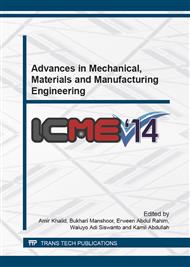p.406
p.411
p.416
p.421
p.426
p.431
p.436
p.442
p.447
Low and High Purity Methanol Effect on Performance and Smoke Emission of Direct Injection Diesel Engine with Cooled EGR Fueled by Diesel Fuel and Jatropha Oil Blends
Abstract:
The aim of this study is to experimentally investigate an effect of low and high purity methanol on a performance and smoke emission of diesel engine with cooled EGR system fueled by diesel fuel and jatropha oil blend. A four-stroke water cooled direct injection (DI) diesel engine with cooled EGR system was used in this work. The diesel engine was fueled by diesel fuel, jatropha oil and low (LPM) or high (HPM) purity methanol blends at the ratio of 100/0/0, 75/20/5, 70/20/10 and 65/20/15 % on volume basis respectively for the variation of engine loads in the range of 25 to 100% with 25% increments at 2000 rpm. Each load for every fuel blend was given by the 0% and 16.5% EGR rates. The results are found that the brake power for diesel engine fueled by diesel fuel, jatropha oil and LPM is approximately 8% lower than that of diesel engine fueled with the neat diesel, while it increases to 5.24% at the low load and reduces to 6.11% at the high load by injecting HPM in the fuel blends. At the same case, BSFC increases approximately 4.5% by injecting LPM in the fuel blends. The brake thermal efficiency rises approximately by 3.3% with LPM in the fuel blends, whereas it increases approximately 6% by injecting HPM. The smoke opacity reduces approximately by 70% with LPM or HPM in the fuel blends.
Info:
Periodical:
Pages:
426-430
DOI:
Citation:
Online since:
October 2014
Authors:
Price:
Сopyright:
© 2014 Trans Tech Publications Ltd. All Rights Reserved
Share:
Citation:


